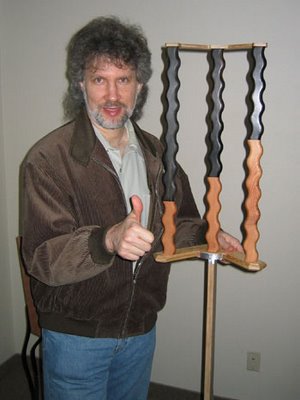Hunt for Hifi III: Trap doors and mirages

Audiophiles are often ridiculed for spending time and substantial amounts of money on snake-oil products. These can vary from little wooden blocks to place speaker cables on like a monorail so that it never touches the ground (presumably to prevent static electricity, or something) to all manners of vibration dampening hocus pocus. The criticism spans from entirely valid, as I would say is the case for the examples I just gave, to dubious, which is the case for things like analogue cables or Digital to Analogue Converters (DAC's).
The problem for the aspiring audiophile is that the boundary between sane science and sonic homeopathy is by no means a straight line; It is more akin to the outline of a fractal pattern, endlessly slithering through all aspects of sound reproduction. Take a speaker cable, for example: It makes sense on a physical level that an unshielded cable is more prone to pick up audible interference than a shielded one, and there are nearly endless measurable qualities of a cables conductive properties that have potentially hearable effects. But at some point it just gets retarded, because how can there be audible deterioration of the signal through a €5.000 cable? What signal transmitting problems are there in that cable that only another €5.000 can fix? I don't doubt that there may be audible differences between those two hypothetical products (though the prices are from real products), but at some point it just gets ridiculous. And that's when generously assuming that the full cost of the cable is due to engineering efforts to rid it of electric flaws.
In reality, there is no shortage of utterly retarded cables. How about audiophile grade USB cables, complete with wooden connectors? Can someone explain to me how a digital transfer protocol with signed packets benefits from fucking wooden connectors, and how the cable can affect the sound quality in any other way than "it works" or "it doesn't work"?
I have a strong skepticism towards small, enthusiast companies producing very technical and complex products. I just don't see how some guy in a basement or garage can match the research horsepower of larger corporations. For €10.000 I expect speakers with custom built, state-of-the-art elements developed from many years of experience and research, not some pricey off-the-shelf components but into a fancy box by some dude with a logo.
So ignore voodoo accessories, companies whos websites "technology" page reads like a physics students DMT trip report and any type of retarded claim of "revolutionary breakthrough". I once saw a japanese amplifier manufacturer that had rounded courners in the paths on the circuit boards, claiming that it made the sound smoother. Such people should be punched in the testicles immediately.
Instead, just listen to good components from companies that either have a good track record based on quality alone, or up & comers that seem to be driven by actual innovation rather than some wannabee me-too clinging to the hifi bandwagon.


0 Comments:
Post a Comment
<< Home